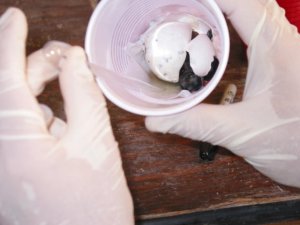Grant: 03-R06R
Project Title: An Improved Non-Invasive Method to Determine Hatchling Sex Using Estrogen:testosterone Profiles in Allantoic Fluid and Blood
Project Manager: Dr. Sarah Milton
Organization: Florida Atlantic University (Research and Educational Institute)
Grant Amount: $16,816.00
Completion Date: 2004-11-30
Summary: This study will utilize High Performance Liquid Chromatography (HPLC) to determine the sex hormone profiles (estrogen and testosterone) in the allantoic fluid and plasma of loggerhead hatchlings. By determining the estrogen profiles for hatchlings, the use of HPLC may provide an accurate, non-invasive technique to determine hatchling sex, which can be performed relatively easily and inexpensively.  Results: Because Florida beaches are so badly eroded, many coastal areas depend on renourishment to maintain their beachfronts. Unfortunately, the sand used in renourishment projects may not be the same as was originally on the beach, altering the nest environment for sea turtles that lay their eggs there every year. One factor that may be changed is beach temperature, as sands may be warmer or cooler depending on their color. Whether hatchling sea turtles are male or female, however, depends on the temperature of the beach: warm temperatures produced more females, and cooler temperatures more males.
This research project was to describe the hormones in the blood and egg fluids of loggerhead sea turtle hatchlings, to determine if it is possible to tell the sex of the hatchling by the presence of male and female hormones. While hormone levels were high in both egg fluids and blood, blood hormone levels are likely to be more indicative of hatchling sex than the fluid wastes excreted into the eggs during development. It is critical to determine the natural sex ratios of these threatened species in order to make appropriate management decisions. (Author: S. Milton)
Results: Because Florida beaches are so badly eroded, many coastal areas depend on renourishment to maintain their beachfronts. Unfortunately, the sand used in renourishment projects may not be the same as was originally on the beach, altering the nest environment for sea turtles that lay their eggs there every year. One factor that may be changed is beach temperature, as sands may be warmer or cooler depending on their color. Whether hatchling sea turtles are male or female, however, depends on the temperature of the beach: warm temperatures produced more females, and cooler temperatures more males.
This research project was to describe the hormones in the blood and egg fluids of loggerhead sea turtle hatchlings, to determine if it is possible to tell the sex of the hatchling by the presence of male and female hormones. While hormone levels were high in both egg fluids and blood, blood hormone levels are likely to be more indicative of hatchling sex than the fluid wastes excreted into the eggs during development. It is critical to determine the natural sex ratios of these threatened species in order to make appropriate management decisions. (Author: S. Milton)